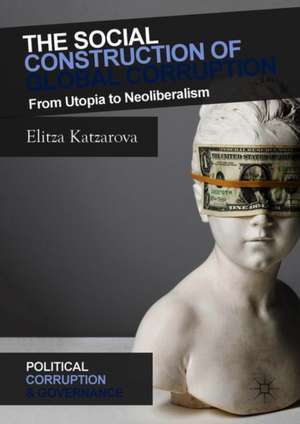The Social Construction of Global Corruption: From Utopia to Neoliberalism: Political Corruption and Governance
Autor Elitza Katzarovaen Limba Engleză Hardback – 17 dec 2018
This book offers new ways of thinking about corruption by examining the two distinct ways in which policy approaches and discourse on corruption developed in the UN and the OECD. One of these approaches extrapolated transnational bribery as the main form of corrupt practices and advocated a limited scope offense, while the other approach tackled the broader structure of the global economic system and advocated curbing the increasing power of multinational corporations. Developing nations, in particular Chile, initiated and contributed much to these early debates, but the US-sponsored issue of transnational bribery came to dominate the international agenda. In the process, the ‘corrupt corporation’ was supplanted by the ‘corrupt politician’, the ‘corrupt public official’ and their international counterpart: the ‘corrupt country’. This book sheds light on these processes and the way in which they reconfigured our understanding of the state as an economic actor and the multinationalcorporation as a political actor.
Din seria Political Corruption and Governance
- 15%
 Preț: 583.61 lei
Preț: 583.61 lei -
 Preț: 385.84 lei
Preț: 385.84 lei -
 Preț: 389.11 lei
Preț: 389.11 lei - 18%
 Preț: 1114.52 lei
Preț: 1114.52 lei - 18%
 Preț: 788.54 lei
Preț: 788.54 lei - 18%
 Preț: 1002.94 lei
Preț: 1002.94 lei - 15%
 Preț: 534.04 lei
Preț: 534.04 lei -
 Preț: 348.98 lei
Preț: 348.98 lei - 15%
 Preț: 580.68 lei
Preț: 580.68 lei - 15%
 Preț: 698.94 lei
Preț: 698.94 lei - 18%
 Preț: 776.09 lei
Preț: 776.09 lei -
 Preț: 354.93 lei
Preț: 354.93 lei - 18%
 Preț: 893.84 lei
Preț: 893.84 lei -
 Preț: 425.80 lei
Preț: 425.80 lei -
 Preț: 324.33 lei
Preț: 324.33 lei - 18%
 Preț: 736.01 lei
Preț: 736.01 lei
Preț: 472.36 lei
Preț vechi: 555.72 lei
-15% Nou
Puncte Express: 709
Preț estimativ în valută:
90.38€ • 94.62$ • 74.79£
90.38€ • 94.62$ • 74.79£
Carte tipărită la comandă
Livrare economică 07-21 aprilie
Preluare comenzi: 021 569.72.76
Specificații
ISBN-13: 9783319985688
ISBN-10: 331998568X
Pagini: 223
Ilustrații: XI, 238 p. 1 illus.
Dimensiuni: 148 x 210 x 21 mm
Greutate: 0.45 kg
Ediția:1st ed. 2019
Editura: Springer International Publishing
Colecția Palgrave Macmillan
Seria Political Corruption and Governance
Locul publicării:Cham, Switzerland
ISBN-10: 331998568X
Pagini: 223
Ilustrații: XI, 238 p. 1 illus.
Dimensiuni: 148 x 210 x 21 mm
Greutate: 0.45 kg
Ediția:1st ed. 2019
Editura: Springer International Publishing
Colecția Palgrave Macmillan
Seria Political Corruption and Governance
Locul publicării:Cham, Switzerland
Cuprins
1: Introduction: The Origin Story of Global Anti-corruption Governance.- 2: Corruption and Its Discontents.- 3: The Social Construction of Global Problems.- 4: Building a New World: Global Claims in the 1970s.- 5: The Corporate Watergate.- 6: The Road to the New Orthodoxy.- 7: The OECD Convention and Beyond: State-powered Coalition Building in a Broken World.- 8: Global Anti-corruption talks in the 1970s and 1990s: The Story of Two Utopias.
Notă biografică
Elitza Katzarova is Visiting Researcher at the Chair of International Relations at Braunschweig University of Technology, Germany. Her current research interests are in the field of corruption and global corporate governance.
Textul de pe ultima copertă
This book offers new ways of thinking about corruption by examining the two distinct ways in which policy approaches and discourse on corruption developed in the UN and the OECD. One of these approaches extrapolated transnational bribery as the main form of corrupt practices and advocated a limited scope offense, while the other approach tackled the broader structure of the global economic system and advocated curbing the increasing power of multinational corporations. Developing nations, in particular Chile, initiated and contributed much to these early debates, but the US-sponsored issue of transnational bribery came to dominate the international agenda. In the process, the ‘corrupt corporation’ was supplanted by the ‘corrupt politician’, the ‘corrupt public official’ and their international counterpart: the ‘corrupt country’. This book sheds light on these processes and the way in which they reconfigured our understanding of the state as an economic actor and the multinationalcorporation as a political actor.
Elitza Katzarova is Visiting Researcher at the Chair of International Relations at Braunschweig University of Technology, Germany. Her current research interests are in the field of corruption and global corporate governance.
Caracteristici
Constitutes the first International Relations monograph to systematically analyse the rise of corruption as a global governance problem Introduces new theoretical and methodological tools to constructivist IR Provides an alternative explanation for the international institutionalization of anti-corruption reforms
